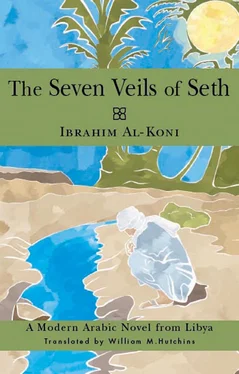The tribes attributed to him provocative verses that denigrated the status of camels and extolled donkeys by contrast. Despite the anger aroused by these verses, which some people interpreted as a challenge to the law of chivalry and a heresy attributable to the common people, many elders discovered that they were not devoid of wisdom, especially since the donkey was the first beast of burden domesticated by their original ancestors. In their lives back then, they had relied on the donkey for assistance even before cattle, which eventually were wiped out by droughts, leaving no evidence behind them in the desert. These men confirmed that it would be slanderous for them to snub their grandfathers’ companion, which had sprung to their forefathers’ rescue, or to celebrate the heroic deeds of the camel, which was proverbial for being as hateful as a slave or a flood. When panegyric poetry ruled supreme and the story was disseminated through the tribes, spiteful individuals jested and thus bestowed on him the epithet Wantahet, inspired by the hero of the story transmitted down through the generations with the comment that the master of the jenny at the end of time would approach villages to entice tribes to a banquet only to pull the banquet carpet out from under them, allowing them to fall into a bottomless abyss. When this message reached him, he responded to these people with a message in the form of a long ode, in which he eventually admitted he was the jenny master but denied that he was the jenny master who would lead the tribes to a banquet in the abyss. He was, rather, the jenny master who would lead the tribes to the banquet of deliverance.
PART II Section 2: The Antidote
The oasis lay in a depression encircled to the south and east by a network of sword-type dunes. It was bounded on the north by a barren plain strewn with rocks that were baked in the inferno of ancient volcanoes and then divided by shallow valleys leading eventually to a distant mountain chain, which was swathed in murky blue. To the west extended a wasteland with even, sandy dirt coated with pebbles. At the heart of the oasis stood a single hill, although it was not originally one and had become a mountain thanks to the flow of a power called time, which leveled the buildings of one generation, reducing them to mounds on which the next generation raised its own. The subsequent act in this everlasting epic was the collapse of this generation’s buildings; thus the structures of later generations rose on that debris. Eventually, with the passing days, the top of all this construction stretched high enough to stand as a real mountain, crowned by caverns and decorated at every step by skulls of bygone generations and the bones of ancestors, whom time had felled and cast down to feed the earth. During its long history, this oasis apparently experienced a flowering that brought it many honors among the oases but also created enemies for it, so that it was subjected to armed raids from neighboring clans. Testifying to this were broken remnants of the oldest wall — incorporated into a later one. These were located by the tomb mountain on the north. The desert world understands from experience that oases only imprison themselves behind walls to defend themselves against violent enemies. It has also learned from experience that enemies only launch attacks on prosperous oases.
Generations have related that the spring, located at the southern limits of the oasis, near the sands, was once part of a great lake, before the wind’s sandy attacks advanced against it in prehistoric times. Out of self-defense, it retreated north, seeking refuge with the rocky desert, for which the northern mountain chains serve as a landmark. Once water nymphs had enticed desert men to abandon their endless migrations, settle down, populate the empty space, and sow the earth, they were able, thanks to this astonishing feat, to lay the cornerstone for the structure of the civilization known to later generations as “the oasis.”
The day he arrived at the market mounted on his jenny, he stopped her at a nearby wall and tossed her a handful of clover for her delectation. Then he went to the square, where the chief merchant hurried to greet him, jubilantly resorting to panegyric hyperbole: “It is reported that Wantahet willingly carries his jenny on his back when wading through mires in the sandy desert or transports her by camel-back, like a precious cargo, thus going out of his way to demean camels.” “Ha, ha. . Why shouldn’t the jenny master carry his jenny on his back, since she protected him one day? Why shouldn’t the jenny master decry the offspring of camels, since his fear of them is not unfounded?”
“The jenny master’s tongue never lacks a response. Only a person granted felicitous use of this organ by the spirit world will ever know happiness.”
“The tongue assures happiness in our world, but eternal happiness depends on the intellect.”
“You’re right. Anyone granted mastery over the tongue will never need to conclude a pact with our master luck.”
“And anyone allied with luck will equally have little need for the tongue. You merchants are the scions of luck.”
“That’s what everyone thinks. Only a few people realize that nothing depends so much on the intellect, which you just mentioned, as does commerce. Because they are ignorant of the truth about this riddle called commerce, people disdain it. The problem is not that common people are naturally opposed to what they don’t understand; they simply have never known the delight of commerce. They don’t understand that landing a deal ranks even above landing a beautiful virgin.”
“I know that no sedentary person practices a profession unless he finds pleasure in its pursuit.”
“Commerce, Mr. Foreigner, isn’t just trade. Commerce does not consist merely of profit or loss. Commerce — like woman — is a plaything. Commerce is a song! Commerce, for the accomplished practitioner, is a stanza in a long epic. The epic is the physical world and commerce is its verses. Commerce’s brilliance is evidenced by its ability to call forth civilization from a void. Were it not for commerce, this oasis wouldn’t have a leg to stand on. If it were not for commerce, we would not have had the pleasure of meeting here in the market today.”
From behind his veil, he watched the merchant with interest but interrupted at this juncture: “Your aria about commerce has moved me, inspiring me to dream up a deal. Ha, ha. . would you imagine that the jenny master would dare engage in commerce by offering a deal to the master merchant?”
The chief merchant smiled a salesman’s cunning leer and then replied, “Why not? A contract lies hidden in everyone’s pocket. In the heart of each creature sleeps a wish that can be converted into a contract. The innards of any individual conceal a contract. A woman is pregnant with a fetus; a man is burdened with a contract. From cradle to grave, our entire life is a contract. Some succeed in fulfilling it early; others only execute it successfully later on, but woe to anyone who fails to conclude a contract, because our contract, master, is our life.”
“Actually my contract will prove equally significant, since you think the only true contract is one that provides deliverance for us, because every deliverance is a life.”
“Yes, every contract is a deliverance and every deliverance is a life.”
“I’d like to sell you glad tidings, cheap.”
“Cheap, glad tidings?”
“You’ll trade me barley, dates, and dried meat for the antidote.”
“Antidote?”
“In my pocket I have an antidote to treat the epidemic threatening the bellies of your women.”
Читать дальше












